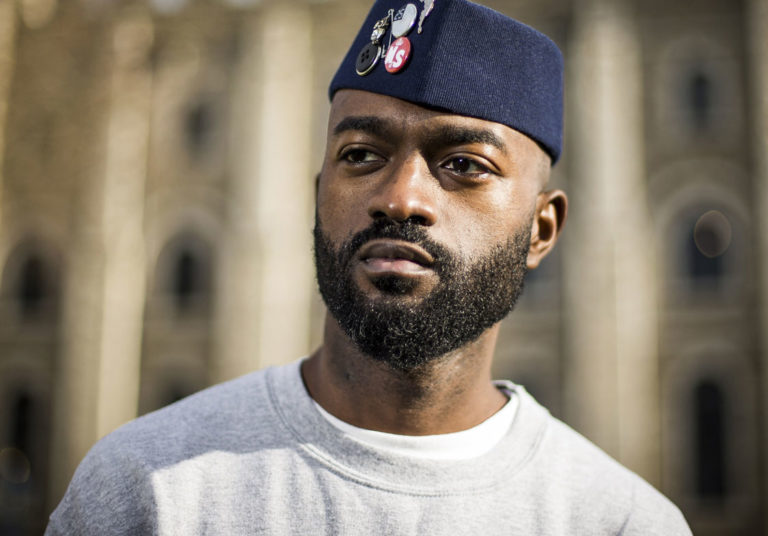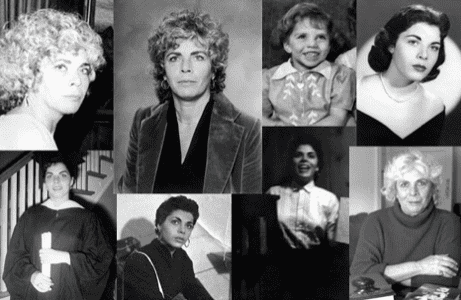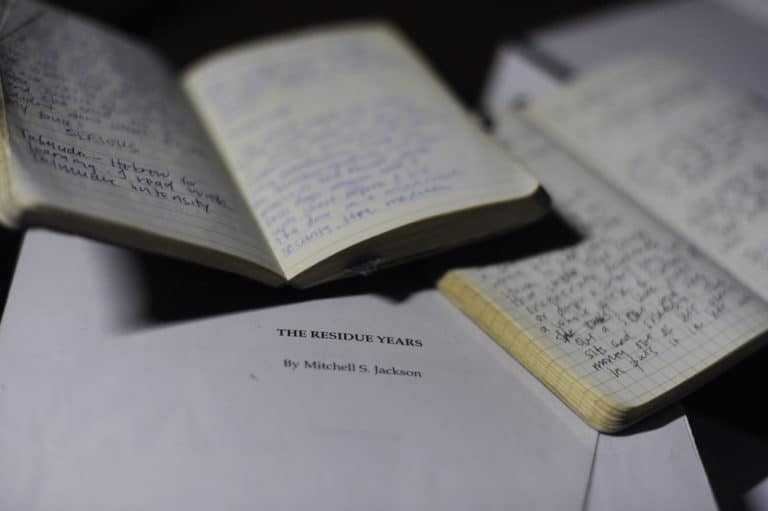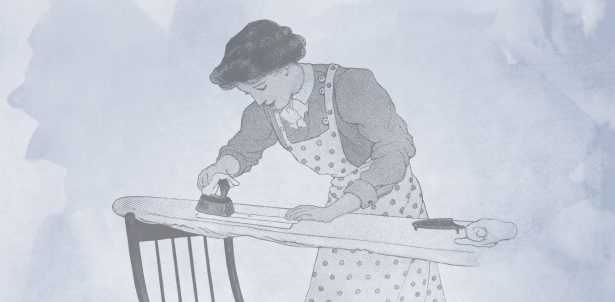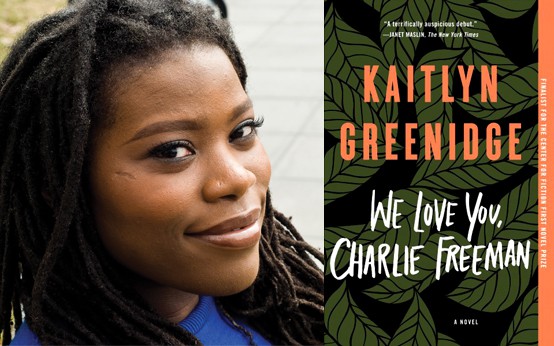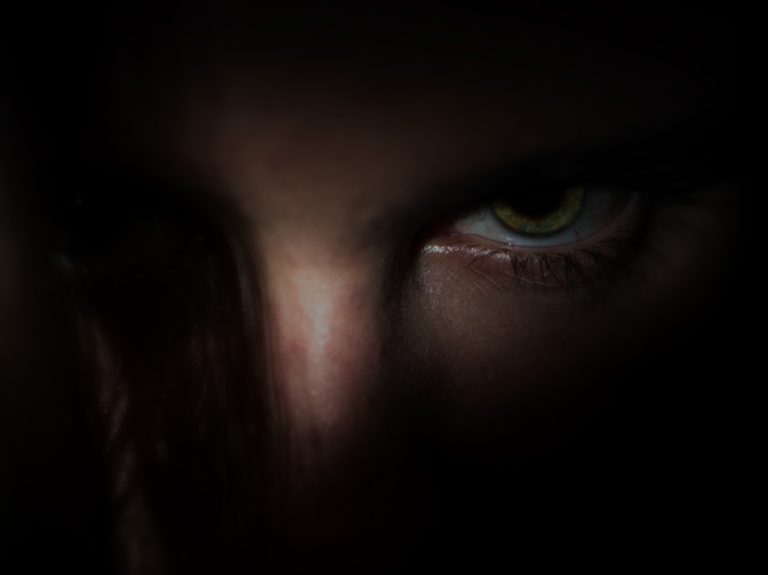It had been a small reading, the kind one expects of course, and I knew everyone who attended, except for one man who was neither an old friend nor an emissary sent by another. He sat at the back scratching his beard, the light on his glasses bobbing sympathetically from time to time. After I said goodbye to my friends, after I signed a few books to be left with the store, I saw that he was still lingering in the back. The store would be closing fairly soon. The people who ran the place were breaking down the set, folding up the chairs, returning the rolling bookshelves to their regular positions. As I put on my jacket, he made his approach.
“Pardon me, I’ve read your novel,” he said, clutching an unusually dog-eared copy. “And I wanted to talk to you, briefly, if I might, about the segment in the chapter ‘War Cash’ when the narrative shifts to the point of view of the injured vet Warren Smith, lying in his hospital bed as a subject in a clinical trial. Why did I know that name, I asked myself, but I had a hunch and ran to my shelves to retrieve Virginia Woolf’s novel Mrs. Dalloway. Sure enough,” he continued, “the ‘dark double’ in Woolf’s novel is a disoriented WWI veteran named Septimus Warren Smith. Clearly this was more than a coincidence, I knew at once. In years past, I’d been obsessed with that novel and how Woolf combined a day in the life of a bourgeois woman with that of a traumatized veteran, and I combed through her diaries at the time to see if I could gain insight into her process. When I read your novel and noticed the link to Woolf, I wondered if there might exist other parallels. I couldn’t help but thinking that this homage, as it were, to Woolf, formed something of the centerpiece of your novel, the molten core from which everything else in the book receives its gravity and its charge.”
“Wow,” I said. “You’re the first person who’s mentioned that—though that’s good, actually, because I didn’t intend it to be crucial, it was more there for me as a gesture towards a novel I’ve always loved. Fear no more the heat of the sun, and all that!”
“Nor the furious winter’s rages!” he rejoined. “So I’m on to something? I knew it! I suppose it’s rather a bold assertion, that this four-page segment constitutes the core of your book, but might I take a moment of your time to explain why I think so?”
“Sure! Of course.” It’s true that I was eager to find something to eat, but it was surprising to meet a reader with a thesis.
“You see,” he continued, “I made some calculations and noted that your novel, despite the marketing emphasis on squirrels, is roughly only 8% squirrel, while it’s more than 35% military-medical industrial complex through the porthole of traumatic brain injury by way of Warren Smith in the lineage of Woolf, and that just about 100% of everybody in the book is suffering from ‘brain damage’ in one form or another. You have your heroine Veblen, depressed and on antidepressants; you have her father, a Vietnam vet, in a mental institution suffering from PTSD; you have the fiancé Paul Vreeland, the neuroscientist, who has invented a device to prevent TBI in warfighters but has yet to address his own psychological issues; you have Paul’s brother Justin, who has brain damage from a birth injury; you have the self-medicating parents of Paul; and ultimately you have the injured vet Warren Smith himself. What was your rationale for filling your book with various brain disturbances and the people trying to deal with them? Not having access to your diaries as I once had access to Woolf’s, I couldn’t help but wonder what you were trying to do and how significant your own mental health issues were in the composition of the novel.”
I was willing to answer, or at least to try. I’d always been interested in mental illness and brain issues. It may have started with this Life Science book I came upon in about 6th grade called The Mind. It had chapters on the nervous system, perception, mental illness, the unconscious, phobias, and so on. It delved into the psyches of artists like Hieronymus Bosch. When I was a kid, and maybe even still, I loved reading biographies of tormented geniuses like Vincent Van Gogh or Beethoven. The more mental illness they suffered from, the more solace and companionship I found in their stories. I suspected myself of having a tendency to depression—my childhood nickname was Eeyore, after the woeful donkey, and I’d grown up surrounded by individuals who had struggled with mental, emotional and physiological issues of all kinds. To think there were people out there who had transformed their inner torment into masterpieces was inspiring to say the least.
Before I could discuss any of this with him, though, he said, “At any rate, I think Veblen, like Clarissa Dalloway, can be seen as the every-citizen double of this veteran, alloyed to his experience by way of a rather grotesque inversion. There’s common ground between the two, they share something, and that something is what I’m saying is at the core of both books.”
“Grotesque?” I repeated, always interested in anything described by that word.
“Yes, quite, I’d say so. Encountering this reincarnation of Smith as a traumatized veteran of current wars reminds me what a long way we’ve come in understanding the assault on the psyches these warfighters have, for time eternal, had to endure.”
I heartily agreed. In the WWI years, the syndrome was commonly referred to as shell shock. After Vietnam it came to be known as PTSD. These days, the Veterans Administration makes allowances for “moral injury” and even recognizes moral injury as a category of wounding, a subset of PTSD. I’d recently read an excellent three-part series by David Wood in the Huffington Post about the topic, in which he’d written:
In contrast to PTSD, which springs from fear, moral injury is a violation of what each of us considers right or wrong…. Are the young Americans who volunteer for military service prepared for the ethical ambiguity that lies ahead? Can they be hardened against moral injury? Should they be?
So I asked this man if he was familiar with the topic.
“Absolutely,” he responded. “It leads one to wonder if our citizens are to be tasked with raising future warfighters for whom the requirements of warfare are not morally injurious. And for god’s sake, would anybody really want that?”
“Exactly.” Then I mentioned Maggie Puniewska’s piece, “Healing a Wounded Sense of Morality” in The Atlantic, in which she added another dimension to the definition of moral injury. “She writes about how moral injury, on top of everything else, is about a loss of trust, in oneself, in the military, even the nation as a whole.”
His eyes were fierce with concentration. “I’d like to posit that moral injury is actually done to a nation as a whole when wrongs are committed by its government. Look at the statistics that came out of post-war Germany, for instance. To be a citizen is to have colluded, is it not? Where does it stop? As Martin Luther King, Jr. pointed out, ‘Injustice anywhere is a threat to justice everywhere. We are caught in an inescapable network of mutuality, tied in a single garment of destiny. Whatever affects one directly, affects all indirectly.’”
“I agree. We’re citizens of countries that send troops to war, so we’re either fighters or witnesses.”
“And since we’re all involved, there’s potential to say we might all be morally injured. I mean, how does one even begin to establish a baseline of moral health as a citizen?” he asked.
Our hosts at the store were closing up the cash register, and just then the lights went off in the refrigerated case of cheesecakes and puff pastries I’d been eyeing from across the room. The man was thumbing to the back of his book, where he’d made a number of notes, and announced he would read from Woolf’s diary of 1922:
Mrs. Dalloway has branched into a book; and I adumbrate here a study of insanity and suicide; the world seen by the sane and the insane side by side—something like that.
He continued, “Is that what you were up to, the sane and insane, side by side? But which is which, who’s sane and who’s not, if you consider moral injury a rational reaction to the violation of these standards? Perhaps Septimus is the sane one. Perhaps your Warren Smith too. While all the while insanity lies with the amoral majority—preoccupied with weddings and parties and flowers!”
I nodded, moodily. I’d often felt that this was the underlying message in Thorstein Veblen’s work about the leisure class and conspicuous consumption. All at once I felt a surge of fundamental gloom to do with the topics I’d written about and which were being brought to the fore by this conversation. It was a fact that my grandfather, a veteran of WWI, a comrade in the Socialist Labor Party, committed suicide in his garage by asphyxiation on the morning of April 1, 1938, and that my father had received the shock of finding him there. Though I hadn’t been consciously thinking about him as I wrote my novel, it might make sense that I’d have an interest in veteran’s issues as well as mental illness and suicidal ideation. I knew that my biological father, the son of the suicidal veteran, had served in the Navy in WWII. He was a gunner’s mate on a fueling ship in the Pacific and had been fired upon. It was clear he suffered from “shell shock”–only later in life diagnosed as PTSD—in ways that interfered not only with his future, but ultimately mine, if I wanted to take it there. It wasn’t hard to see how trauma begets further trauma. I knew that his father’s suicide, when he was a boy of ten, caused him much grief. At 16, he enlisted in the Navy, eager to escape the gloom at home. His military experiences then compounded his previous issues, which arguably led to a life of sporadic employment, multiple divorces, and periodic estrangement from his only child.
The generational transference of trauma is covered in Elizabeth Rosner’s powerful new book Survivor Café, and I asked the man if he’d seen it. It was in the store; I went over and grabbed a copy. “Here Rosner talks about the field of epigenetics in which, ‘researchers are attempting to unravel the mysterious mechanisms by which the trauma of parents and grandparents is transmitted to subsequent generations.’” I wasn’t sure I could claim to have inherited my father and grandfather’s trauma, but the ripples had come my way, I had to admit.
Just then, one of the clerks came by and whispered in my ear. “He always does this,” she said.
“Oh, seriously?”
“I can ask him to back off if you want.”
I shook my head. Really, with everyone? What a lot of energy he must have. The man had found something else in his notes, and continued.
“And now, if you don’t mind, my next question to you is this: Why had Woolf disguised an exploration of her own psychic struggles within the figure of a returned soldier? Was it simply too inexplicable that a well-fed woman of culture and means could suffer in a way we would understand a traumatized vet to suffer? Was it due to the secret nature of her trauma, that her half-brothers had abused her when she was a girl? Would we have believed it, or been sympathetic to it, if it had been Clarissa Dalloway, while buying her flowers and preparing for her party, who fell into the disturbed fugue state as demonstrated by Septimus, an apparent facsimile of the type of state Woolf herself would fall into?”
“That’s right,” I chimed in. “Her bouts of madness were legendary. In fact, Woolf’s early drafts of Dalloway had Clarissa committing the suicide of this novel. Septimus didn’t yet exist. But she brought him in and gave him her madness, and there’s no denying the novel is all the better for it.”
“What was your thinking in giving the most extreme mental state in your novel to a war veteran with PTSD?” he asked. “Were you disguising an epigenetic inheritance of your own? Or was it a nod to current events? Perhaps, in a ‘Madame Bovary, c’est moi’ sort of way, you were simply divvying up aspects of your psyche among your characters?”
I nodded in a daze. Great as it was to get some feedback, I figured it was time to hit the road.
We moved towards the door, and I said, “Well, thanks for everything. You’ve given me a lot to think about. I feel totally honored you took the time.”
“Let me just say a couple more things,” he persisted. “We still have to get at why trauma spawns creativity for some, while for others it leads to self-destruction, and yet still others walk the razor’s edge between the extremes throughout their lives. In your novel you quote William James a number of times, and you mention his essay ‘The Energies of Men.’ As you know, in it James describes the strange phenomenon of mental stamina, that feeling of having ‘reservoirs of energy that habitually are not tapped’—unless one has a ‘second wind.’ James goes on to say that ‘either some unusual stimulus fills us with emotional excitement, or some unusual idea of necessity induces us to make an extra effort of will.’ Wouldn’t you agree that the ‘unusual stimulus’ is often a traumatic event, either buried or fully evident?”
I added, “Woolf wrote in her diary about the inevitability of receiving shocks to her system, but that the shock-receiving capacity is what made her a writer. And I remember another entry where she addressed her creative impetus: ‘What a born melancholiac I am! The only way I keep afloat is by working…directly I stop working I feel that I am sinking down, down.’ So James seems to allow that unusual stimulus, a subset of which is trauma, can create the energy to write, and Woolf allows that writing staves off melancholy.”
“The two seem connected,” he said. “So what do these damaged individuals in your novel mean to you, Ms. McKenzie? Is this a memoir disguised as a novel? I’d like to venture that the PTSD and brain trauma of veterans can be seen, in your novel, not only as representative of the mental health of individual citizens, for yours is a political novel at its core—”
“—but maybe as a roundabout telling of some of my own inheritance of trauma that links me to the very same war that claimed Septimus!” I blurted out, thinking this was maybe a bit of a stretch, but compelled by the stretch all the same.
“Think about it, one type of brain damage begets another,” he added. “Combat injury can lead to domestic injury. Trauma mutates. Trauma for some may become something to make jokes about—much as you went for the ridiculous and the absurd. ‘Humor is to be malicious with dignity,’ Freud wrote. Why did you need to be malicious with dignity? Is dignity the last, best possession of the powerless?”
Before I could compose a response, he provided parallel definitions of trauma and of humor. According to a psychiatrist and behavioral scientist at Stanford, David Spiegel, trauma is, “a sudden discontinuity in experience: one minute everything is fine; the next, one is in serious danger.” Meanwhile, he told me, philosophers like Kant and Schopenhauer had described an incongruity theory of humor, brought about by sudden, unexpected shifts in perspective.
“So,” he put forth, “I wonder if it can be said that humor and trauma have similar origins? Is a joke a miniature trauma? Could we say that a small dose of incongruity can make us laugh, but a large dose places us in an ongoing echo chamber of pain? Is it akin to the difference between the inoculation and the disease, a small pox vaccine vs. small pox itself? And more to the point, can a joke ‘inoculate’ us to larger traumas?”
“I doubt it,” I said, feeling punchy all of a sudden. “You know, I think my synapses are starting to sputter, I’d better take off.”
At last we left the store, saying goodnight to the staff. He followed me into the parking lot, where we stood next to my car. I began to shiver. “One last thing,” he said. “On the subject of suicide? Unlike Woolf’s Septimus Warren Smith, who throws himself off a building before the day is through, your Warren Smith does not kill himself, even after assaulting Paul and nearly strangling him. Your Warren Smith leaves the trial and goes home with his wife and sweet daughters. And yet we surely can’t help wonder if the other shoe will drop sometime soon. Will he make it? Will the support of his family be enough to buoy him above the pain and darkness? Needless to say, such an outcome can’t be precluded from his future, wouldn’t you agree?”
“No,” I said. “It can’t be ruled out.”
“As you know, veterans are twenty percent more likely than nonveterans to kill themselves. This is the latest 2017 statistic from the department of Veterans Affairs. In fact, the suicide rate for female veterans is 250 percent higher than it is for female non-veterans. And get this, a study in the UK shows that suicides among artists occur 4 times as often as in the general population—whatever that proves.
Here,” he said, looking again into the back of his book, “have you read Woolf’s suicide note to her husband Leonard?”
He thumbed again to the back of his book, and read:
Dearest,
I feel certain I am going mad again. I feel we can’t go through another of those terrible times. And I shan’t recover this time. I begin to hear voices, and I can’t concentrate. So I am doing what seems the best thing to do…
As he delivered Woolf’s final note, I was reminded that indeed, I had originally written Warren Smith’s suicide into The Portable Veblen. Through many drafts he hung himself in a closet at the VA. Yet in the final analysis, the suicide felt inadequately dealt with within the comic structure of the novel as I had conceived it.
It was 2012 at that juncture in the writing, and I was regularly encountering articles like this one in the New York Times: “Suicides Outpacing War Deaths for Troops.” Yet despite all this talk of Mrs. Dalloway and suicide, I recollected it hadn’t been Woolf’s Septimus alone who inspired Warren Smith. There had been a living, breathing model, a survivor. I had collected folders full of articles like these but clearly remembered a relatively upbeat profile I’d read in a Veterans Administration newsletter from 2009, about a Marine Lance Cpl. Nick Riccio from South Carolina. His trauma and injuries helped me conceptualize those of the character of Warren Smith. His was a case seen as a success overcoming a traumatic brain injury sustained in Iraq. “A round hit the tree right above us and rained down shrapnel…A piece of shrapnel entered the back left side of my head, sliced through my brain, and exited my right temporal lobe,” he later remembered. His heart stopped twice on his way to the hospital in Baghdad, where a craniotomy was performed in time to keep his swelling brain from further damage. After he stabilized, he took part in three months of intensive rehab therapy. Further adjustments included having to give up his lifelong goal of being a career Marine, and dealing with severe PTSD. His VA case manager, I recalled, said with pride: “Nick’s done so phenomenally well.”
Not long ago, though, I’d had the urge to check up on Riccio, hoping to find further news of his life. What I found was his obituary. In 2015, ten years after his original injuries, he died in his sleep at the age of 29. His father recounted his ongoing physical pain, how he “had always been feeling badly.” He had suffered migraines and flashbacks to combat, short-term memory loss, and anxiety. The family was awaiting results from the autopsy at the time of the obit, and I could find nothing further.
How many veterans died years after the fact like this? Was Riccio’s death counted as a war casualty on the lists maintained by the Department of Defense? Riccio had received a Purple Heart for his injuries, but the prevalence of “invisible” injuries, such as concussive Traumatic Brain Injury, considered the signature injury of the wars in Iraq and Afghanistan, had led to changes in the awarding of the Purple Heart. In 2010, NPR reported on the “elusive” Purple Heart for those with concussive TBI, an injury that more often than not permanently changed the lives of those who sustained it. By 2011, NPR reported that the Army had clarified the rules for obtaining the Purple Heart, now recognizing internal TBI injuries as worthy of the medal.
As of this writing, there is no medal for those suffering from life-altering PTSD. In May of 2017, Nathan Fletcher wrote a piece for the Washington Post headlined with this entreaty: “Veterans with Mental-Health Injuries Deserve Purple Hearts, Too.”
The man had finished reading Woolf’s suicide note, and was gazing at me expectantly.
“Do you remember one of the thoughts going through Septimus’s head in Dalloway? ‘The whole world was clamouring: Kill yourself, kill yourself, for our sakes.’ As if the world would be better off without him—any depressive understands this kind of thinking, wouldn’t you say?”
“Absolutely.” But then I said, “Don’t forget that only hours before his suicide, Septimus was sitting in the park overwhelmed by beauty, tears running down his face.” And I added that to read Woolf’s diaries is to find passages like this, when she was at work on Mrs. Dalloway in 1924:
…coming back the other evening from Charleston, again all my nerves stood upright, flushed, electrified (what’s the word?) with the sheer beauty—beauty abounding & superabounding, so that one almost resents it, not being capable of catching it all, & holding it all at the moment…
And that there are to be found other joyous entries too, right up to that March day in 1941, when she went marching into the river with her pockets full of stones.
“During the war,” I added.
“Yes, very much during the war,” he said.
“And they didn’t find her for weeks,” I added.
“Only the walking stick,” he replied.
I had often wondered what my grandfather’s trajectory towards suicide had looked like. One of the only things my father ever told me about his father was that he had a sense of humor. Nevertheless, the day came when the boy, my father, discovered his father’s lifeless body, and was messed up thereafter, and a terror to me as a girl.
“Well, I guess it’s time to go. I apologize for confronting you with all of this. I imagine as a writer of fiction you prefer to go at things more obliquely. Or more metaphorically at least.”
“I guess so,” I said. “But thank you, really. There’s no doubt, you’re a—really deep reader.”
“Yes, that’s what my book group says. I drive them mad. I hope I didn’t drive you mad?”
“Not at all. Thanks again.”
“Good night.”
“Good night!”
I unlocked my car, threw in my bag, but turned quickly as he walked away. “The only thing driving me mad is the current political climate,” I called out.
“No doubt,” he called back.
Our breath rose in plumes, our warm human cores persisting. With a strange lump in my throat, I had to add: “But it’s a beautiful night, isn’t it?”



